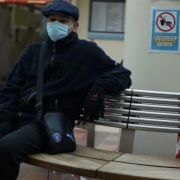Centralized Government Controls Imperil The Communities In Which Our Lives Have Meaning.
During this seemingly endless pandemic, we now find so many of our freedoms not only under threat, but in some cases already severely curtailed or completely removed. Social-media accounts challenging the government’s illiberal response to the pandemic have been taken down. The police have cracked down hard on protests against lockdown restrictions. And even our freedom to associate with friends and family has been severely curtailed.
Freedoms which, until a few months ago, we had taken for granted, have been taken away. We now have to make do with enforced social distancing, stay-at-home orders, and warnings of Armageddon to come if we do not comply.
As a consequence of such harsh restrictions, we have been robbed, ultimately, of the freedom to be ourselves. Not in the identitarian sense. We have never been freer to declare ourselves the opposite of what we are – a man or woman, black or white, or indeed somewhere in between. We are free to adopt whatever identities we choose, increasingly with the sanction of the state and the promise of a Twitter pile-on if anybody transgresses against these strange new orthodoxies.
But we have been robbed of the freedom to be our social selves. The freedom to be our outward-facing selves. The freedom to be the people we are as part of our wider community.
This freedom may sound paradoxical, given community is sometimes portrayed as the enemy of individual freedom; something from which the individual must liberate himself; something that binds and inhibits him. And this, of course, can be true. Young people, for instance, can feel suffocated by the constraints imposed by the older members of their community. The unconventional and the ambitious want to escape their villages and suburbs. They want to be free of the community’s restrictions on their lives.
But, as we are now finding out, the opposite can also be true. Being separated from our communities and collectives deprives us of our freedom to be ourselves with others. We see the barriers everywhere. The churches are closed, the pubs shut and the cafes takeaway only. Conviviality is stifled on shuttered-up high streets, and conversation is muffled by masks. Everyday life is strained and undermined by the imposition of measures and laws that may or may not make sense, and in whose making we played no part.
We are separated from each other, whether out of obedience to the latest lockdown restrictions or out of fear and anxiety. In the absence of the conversations we used to have with each other, face-to-face and unencumbered, there is no freedom. For that is where our liberties spring from – other people. Through the expression of our sociality, through our engagement, our conflicts and our building of solidarities with others.
Conformity is a problem for any community, of course. There is not nearly enough questioning of what we are being put through. But in the end it is only through our collective actions and our interactions that pressure will be exerted and minds will be changed.
As relentless, continual lockdowns bear down on our social nature, we begin to understand how much we need each other. We wonder what became of those mutual-aid groups that sprang up in March almost overnight, only to disappear as they were crowded out by overbearing and authoritarian officialdom. We should remember their example. If we want to regain the freedom to be ourselves, to do things for ourselves and act in our own interests, then we must do so as a community of individuals, working together. That is the only way we will free ourselves from the tyranny of fear and restrictions that we are living under.




